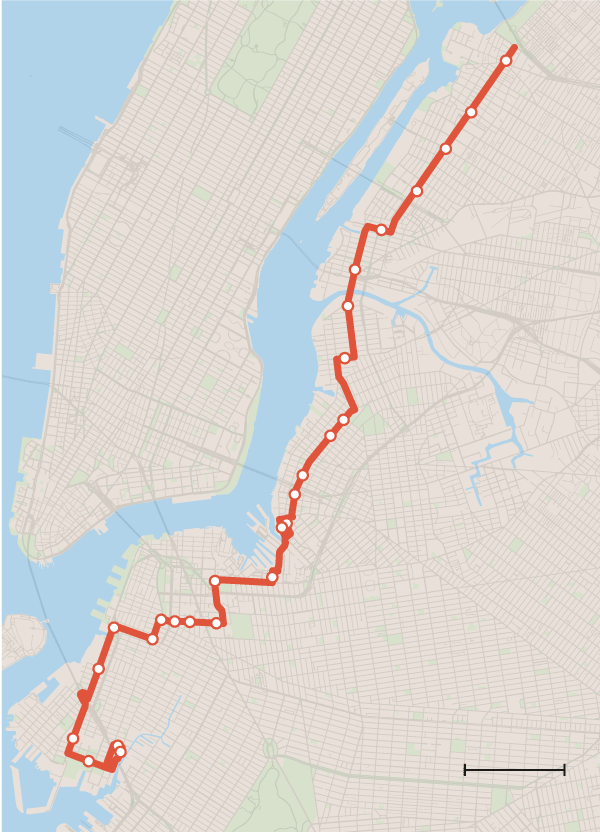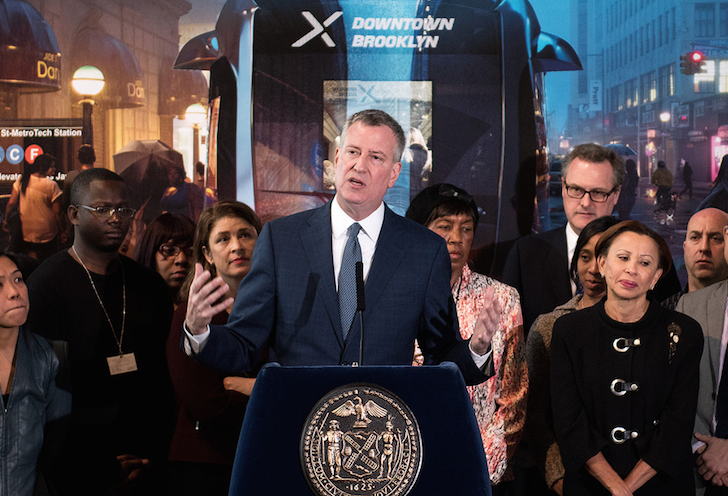Is it really possible that Mayor de Blasio is still considering building his $2.7-billion BQX streetcar even as the city is slashing programs amid the coronavirus crisis?
Critics — including longtime BQX foe Brooklyn Council Member Carlos Menchaca — say now is the time to finally bury the 11-mile light rail between Red Hook and Astoria and use its resources for transportation projects that would benefit more people and move them efficiently, such as dedicated bus lanes and building out the bike network.
“If anything, the COVID-19 crisis we are facing reminds us of the importance of our public dollars and streets. The BQX continues to be a waste of our time, money and attention,” said Menchaca. “What we need, and have always needed, are safe streets and equitable investment in real transportation solutions for New Yorkers. We must expand and improve bus service, and make streets safe for pedestrians and cyclists.”
Mayor de Blasio declined on Wednesday to say that the BQX is dead, even though the city has not allocated any new funding for the streetcar in its budget proposal and an environmental review that was supposed to have begun has not yet. Still, the mayor hinted that he's still considering allocating hemorrhaging city funds to pay for it.
"Now, that was going to be obviously an initiative that could only work with very substantial federal funding," he said. "But to the extent there was any city exposure, it has to be considered now as part of our budget process. It will be discussed in the budget process and be part of what we say around the budget in June.

“We're certainly going to look at the BQX and make decisions, thinking about those same realities. I don't want to give you a firm answer today" de Blasio added.
Hizzoner originally pitched the BQX back in 2016, saying then that it would entirely pay for itself from revenue generated by development that would be spurred along its route. But he later changed his tune and said in 2018 that the city would need about $1 billion from the federal government to fund it.
But to spend anything would be a slap in the face to other transit riders, especially bus commuters, whose service will be negatively impacted due to cuts to the city's Better Bus Initiative, said Ben Fried of Transit Center.
“Even in flush times, the BQX was a bad use of limited city funds. Now, with City Hall forced to cut billions of dollars from the budget — including delays to the bus improvement program — it would be outright criminal to keep funneling money and staff time to a project with so little benefit for transit riders,” said Fried.
The fact that it's even still on the table when the city is cutting funding left and right from other crucial projects is ludicrous, said Bruce Schaller, a transportation consultant and former senior Department of Transportation official.
"It's a complete waste of time. Its purpose was to elicit campaign donors. Why are we still even talking about it? We didn't have the money then and don't have it now," said Schaller.
But some advocates for a better, post-COVID-19 city are still clanging the bell for the BQX. Traffic engineer Sam Schwartz, a longtime supporter, said now is the time to build it — albeit with funds from the real estate industry that will benefit from a new transit line running through a lot of ritzy neighborhoods.
"It's absolutely the time build it. We don't even need to involve the feds — get the real estate industry. Let them put up the cost," said Schwartz.
The organization advocating for the BQX says, once the crisis is over, it's still looking forward to building a new mode of transportation along the Brooklyn and Queens waterfront, which will hopefully create thousands of more jobs and millions in value capture.
"Coming out of this crisis, it's critical that we prioritize infrastructure projects that will help get New Yorkers back to work — and the BQX is an investment that would do just that, creating tens of thousands of jobs, and $30 billion in economic value over the coming decades," said Friends of the BQX Executive Director Chris Torres.






